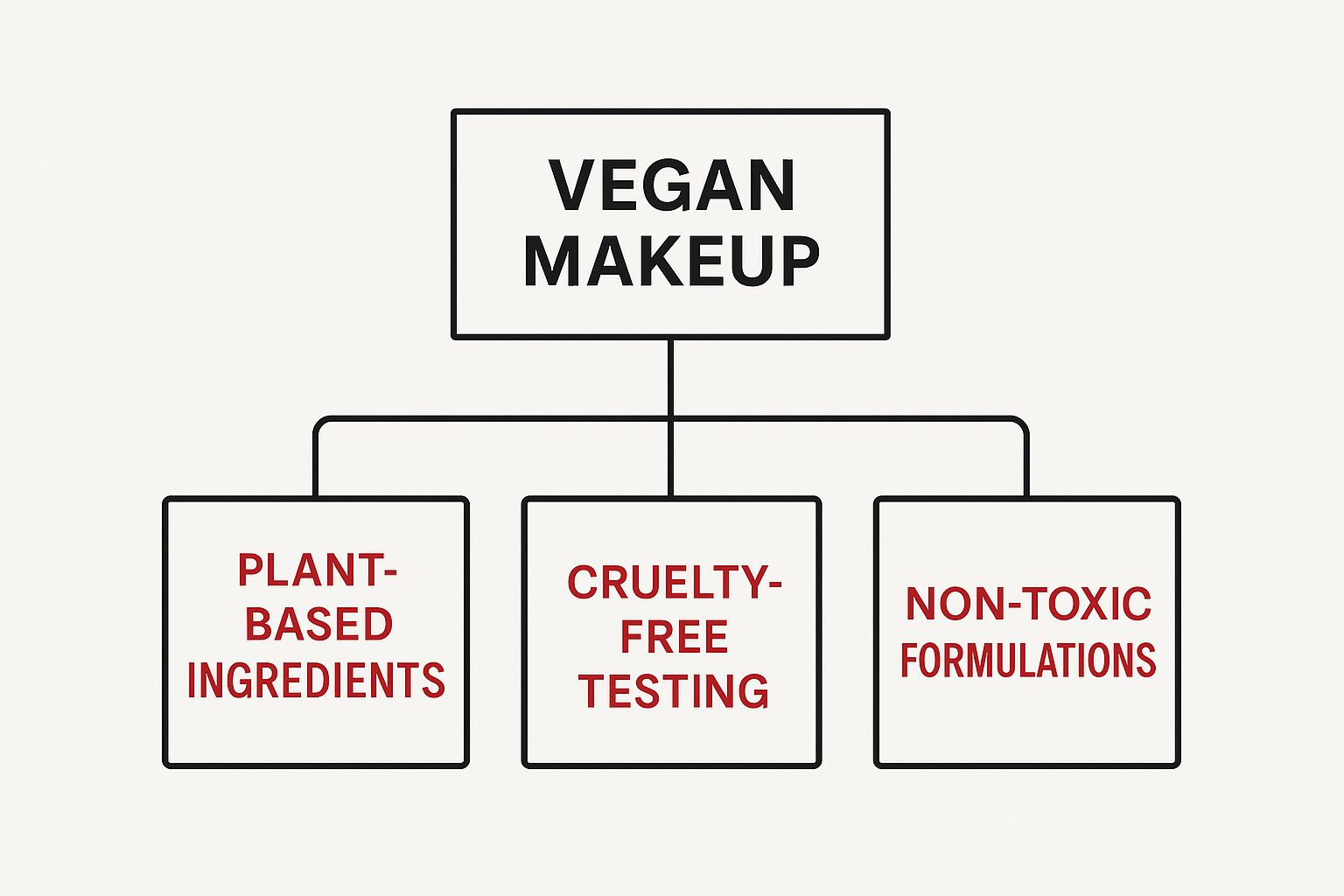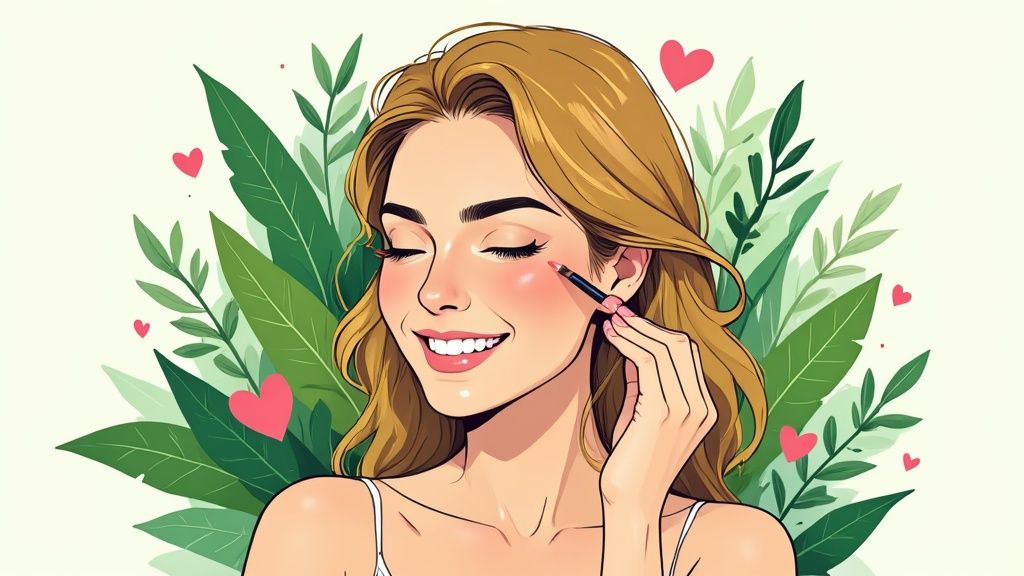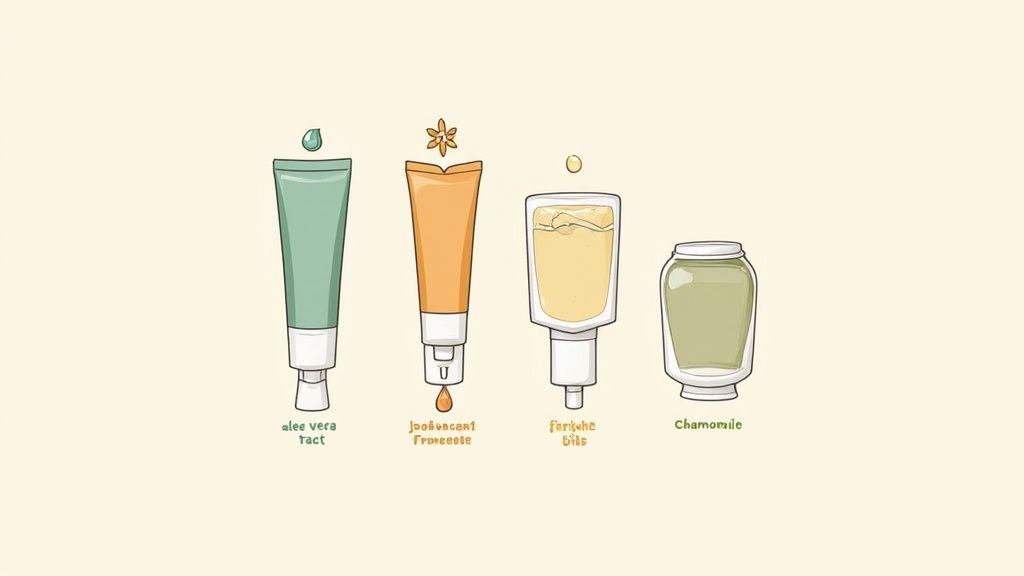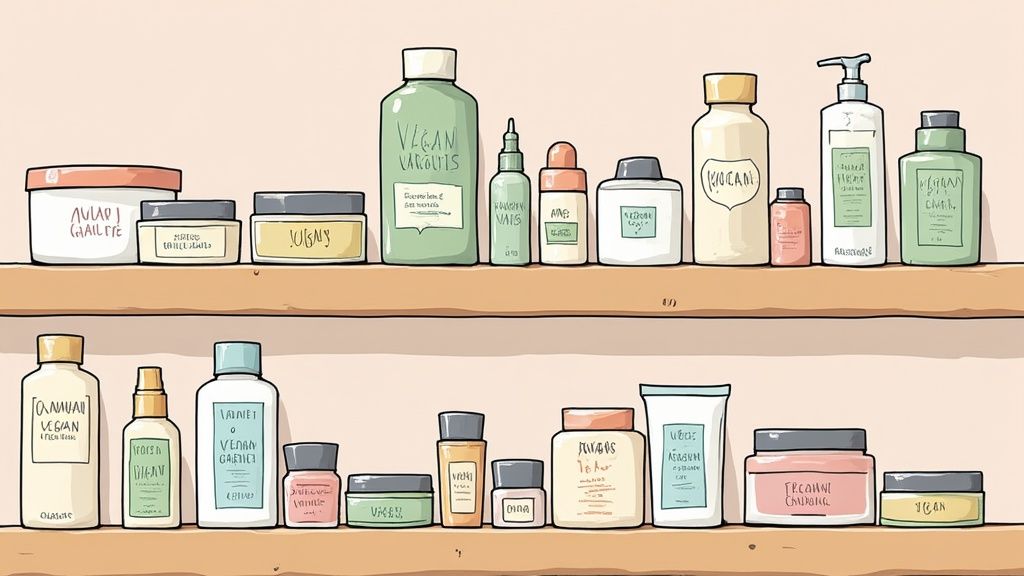At its simplest, vegan makeup means a product made with zero animal-derived ingredients or by-products. It's like a plant-based diet, but for your face. That means no beeswax, no lanolin (which comes from sheep's wool), and definitely no carmine (a red pigment made from crushed insects).
Decoding Vegan Beauty Beyond the Label
Navigating the world of ethical beauty can feel a little confusing. A lot of terms get thrown around that sound the same but have totally different meanings. Getting clear on them is the first step to making choices you feel good about.
Here's the main thing to remember: "vegan" is all about the ingredients.
But a product can be vegan (no animal ingredients) and still be tested on animals. On the flip side, a "cruelty-free" product isn't tested on animals but might contain stuff like honey or beeswax. This is a huge distinction, and it’s why so many of us look for products that are both vegan and cruelty-free.
This shift in awareness is making waves. The global vegan cosmetics market was valued at USD 18.20 billion and is expected to hit USD 33.39 billion by 2034. People are voting with their wallets for kinder products.
The Pillars of Vegan Cosmetics
This infographic breaks down what really goes into a vegan makeup product—from the formula itself to the ethics behind it.

As you can see, true vegan beauty is more than just a checklist. It's a combination of plant-based formulas, ethical testing, and usually, a commitment to clean, non-toxic ingredients, too.
This big-picture approach is what conscious beauty brands are all about now. They get that it's not just about what you're avoiding, but about a whole philosophy of kindness. We take this to heart, which you can read about in our story on why we chose to be a vegan-first brand.
To clear things up even more, let's break down the key terms you'll see on packaging.
Vegan vs Cruelty-Free at a Glance
| Term | What It Means | Key Takeaway |
|---|---|---|
| Vegan | The product contains no animal-derived ingredients or by-products (like honey, beeswax, lanolin, carmine). | Focus is 100% on the ingredient list. It says nothing about animal testing. |
| Cruelty-Free | The product and its ingredients were not tested on animals at any point during development or production. | Focus is 100% on the testing process. The product may still contain animal ingredients. |
The takeaway? If you want to avoid both animal ingredients and animal testing, you need to look for products that are explicitly labeled as both vegan and cruelty-free.
Ultimately, choosing vegan makeup is an investment in products that are mindful of animals. And as a happy bonus, you often end up with formulas that are gentler on your skin and kinder to the planet. It’s beauty without compromise.
The Hidden Animal Ingredients in Your Cosmetics

Ever wonder what gives that lipstick its vibrant red pop or that eyeshadow its perfect shimmer? It might be more than you bargained for. A surprising number of conventional makeup products rely on ingredients that come from animals, often tucked away behind confusing names on the label.
Honestly, it feels a bit like a bait-and-switch. You buy a product for its color or texture, not realizing it was made with crushed bugs or wool grease. The good news? Innovative brands have proven these ingredients are totally unnecessary. Modern, plant-based alternatives deliver the same—if not better—performance without harming a single animal.
Common Culprits on the Ingredient List
Once you start understanding makeup ingredients, you’ll begin to spot the usual suspects everywhere. It’s the first step to really knowing what’s in your makeup bag.
Here are some of the most common ones to watch out for:
- Carmine: This is a big one. It’s a deep red pigment made from crushing female cochineal insects and it’s behind many of the red, pink, and purple shades in traditional lipsticks and blushes. We have a whole guide on what cochineal red insect dye is if you want to dive deeper.
- Lanolin: Basically, it’s grease extracted from sheep's wool. You’ll find it in lip balms and lotions for its moisturizing properties. Much kinder (and effective) alternatives include shea butter and coconut oil.
- Guanine: This one sounds innocent enough, but it’s derived from crushed fish scales. It’s what creates that pearlescent, shimmery look in highlighters, bronzers, and nail polishes. Vegan options like mica give you all the glow without the fish guts.
- Beeswax (Cera Alba): A go-to thickener in cream-based products like mascara and lip balm, collected directly from beehives. Plant-based waxes like candelilla and carnauba do the exact same job beautifully.
Learning to spot these hidden ingredients is empowering. It means you can confidently choose products that actually align with your values. Vegan makeup isn't just about avoiding these things; it's about embracing powerful, effective plant-based ingredients that make the old way of doing things totally obsolete.
Benefits of Vegan Makeup for Your Skin and Planet

Choosing vegan makeup feels good for a lot of reasons, and it goes way beyond just helping animals. It’s also a seriously smart move for your skin and the planet. Think of it like a chain reaction—one small change for the better ends up having a much bigger, positive impact.
When you go for vegan formulas, you’re usually getting products loaded with amazing plant-based goodies. We’re talking vitamins, antioxidants, and super nourishing oils. These ingredients tend to be gentler on the skin, which is a huge win, especially if you have sensitive skin that gets irritated easily. Instead of animal-derived fillers, you get powerhouse ingredients straight from nature.
A Kinder Choice for the Environment
The good vibes don't just stop at your skin. By picking plant-powered beauty, you’re helping to lower the demand for animal agriculture—an industry that puts a massive strain on the environment. It’s a simple way to vote with your wallet and be part of the bigger conversation around what vegan makeup truly stands for.
There’s a clear trend happening: people are wising up to sketchy chemicals and want healthier, more sustainable options in their makeup bags. Brands are finally listening, shifting to plant-based, organic ingredients with a focus on where they come from. If you want to nerd out on the numbers, you can discover more insights about the global vegan cosmetics market and see just how big this movement has become.
By choosing vegan, you aren't just avoiding certain ingredients. You are actively supporting a system that values gentler formulas, clearer sourcing, and a lighter environmental footprint.
That sweet spot where personal wellness meets planetary health? That’s the heart of vegan beauty. It’s proof that what’s good for you can absolutely be good for the world, too. Every swipe of a vegan lipstick or dab of plant-based concealer is a small step toward a more sustainable future. And that’s something to feel great about.
How to Shop for Vegan Makeup with Confidence
Making the switch to vegan makeup is exciting, but let’s be real—the beauty aisle can feel like a pop quiz you didn’t study for. Between all the different labels and super-long ingredient lists, how can you be sure what you’re actually getting?
The secret is to learn the shortcuts first. Think of official certifications as your fast-pass to confidence. When you spot a trusted logo on a product, it means a real organization has already done the heavy lifting and verified the brand’s claims for you. Easy.
Look for Certified Vegan Logos
These logos are the quickest, most reliable way to know a product is genuinely vegan without having to pull out your reading glasses for the fine print.
So, what should you keep an eye out for? While there are a few out there, the most common symbols are a great place to start. A quick glance for these logos will tell you almost everything you need to know.
Common Vegan Beauty Certifications
Here's a quick-reference guide to the most common logos that guarantee a product is vegan.
| Certification Logo | Certifying Body | What It Guarantees |
|---|---|---|
| The Vegan Society | This sunflower is one of the most recognized vegan certifications in the world. It guarantees the product contains zero animal ingredients or by-products. | |
| PETA | People for the Ethical Treatment of Animals offers this logo to confirm a product is both 100% vegan and cruelty-free. It’s a fantastic two-in-one assurance. |
Remembering these two logos will make your shopping trips so much simpler.
It’s also super important to know the difference between "vegan" and "cruelty-free." A lot of amazing brands are both, but the terms aren't interchangeable. Our guide to cruelty-free makeup brands breaks it all down if you want to dive deeper.
Brand transparency is your greatest asset. A company that is genuinely committed to vegan ethics will make it easy for you to find this information on their packaging, website, and product pages.
Beyond just looking for logos, getting comfortable with reading ingredient lists is an empowering skill to build over time. You don't need to memorize a dictionary of cosmetic chemistry, but learning to spot common non-vegan culprits like carmine, lanolin, and beeswax will make you a much savvier shopper.
A Look at Vegan Cosmetics in Action

To really get what vegan makeup is all about, it helps to see it in the wild. Brands like Axiology show that this isn’t just about dodging a few ingredients; it’s about rethinking beauty from the ground up.
This isn't just about slapping a "vegan" label on a product and calling it a day. For Axiology, being 100% vegan and cruelty-free is just the starting point. The brand also takes a hard pass on palm oil, an ingredient notorious for causing massive deforestation and habitat loss. By formulating everything without it, Axiology extends its ethical promise from animals to entire ecosystems.
Earth-First Ingredients and Zero-Waste Design
Instead of the usual fillers, Axiology's formulas are packed with unique, earth-derived ingredients that are actually good for your skin. We're talking deeply moisturizing kokum butter, nutrient-rich avocado oil, and protective elderberry oil. These ingredients aren't just there to provide beautiful, lasting color—they’re chosen for how gentle and beneficial they are.
That philosophy of care goes all the way to the packaging. Axiology’s multi-use Balmies are the perfect example of this.
- Totally Plastic-Free: The Balmies come without a tube, wrapped in recyclable paper instead. It's a direct shot at the beauty industry's massive plastic problem.
- Zero-Waste: They're made to be used right down to the last little bit, so nothing gets left behind.
- Do-It-All Color: These are 3-in-1 color sticks for your eyes, lips, and cheeks. They simplify your routine and cut way back on the need for extra products and packaging.
This is what modern vegan makeup looks like: thoughtful formulas, sustainable practices, and beautiful results without compromise. It’s about creating products that are kind to animals, gentle on your skin, and respectful of our planet.
Common Questions About Vegan Makeup
As you dive into the world of vegan makeup, a few questions always pop up. It makes sense. So, let's clear the air on some of the most common ones so you can feel 100% great about what you're putting in your makeup bag.
Is Vegan Makeup Better for Sensitive Skin?
For a lot of people, the answer is a big yes. Vegan makeup tends to lean on gentle, plant-based ingredients while skipping common animal-derived irritants (looking at you, lanolin).
Formulas rich in natural oils and butters can be super nourishing and much happier on the skin. But remember, anyone can be sensitive to any ingredient, even a plant one. So, the golden rule still applies: always patch-test a new product before going all in.
Does Vegan Makeup Perform as Well as Traditional Makeup?
Absolutely. Let's bust this myth right now. The idea that vegan makeup doesn't hold up is seriously outdated. Maybe years ago there was a bit of a gap, but cosmetic science has more than caught up.
Today, innovative brands are using incredible plant-based and synthetic alternatives that deliver vibrant pigments, gorgeous textures, and serious staying power. Honestly, these modern formulas often outshine their non-vegan counterparts in quality and performance.
If a Product Is Cruelty-Free Is It Also Vegan?
Not always, and this is probably the most important distinction to get straight. Cruelty-free means the product and its ingredients were not tested on animals. That’s it. It can still be packed with animal-derived stuff like beeswax, honey, or carmine.
To make sure a product ticks both ethical boxes, you need to look for two separate things:
- A cruelty-free certification (like the Leaping Bunny).
- A vegan certification or a clear statement on the packaging that the product is vegan.
Is Vegan Makeup Always More Expensive?
Nope. Not at all. Sure, there are some luxe vegan brands out there, but the massive growth in demand has made vegan makeup available at every price point. You can find amazing options from affordable drugstore brands to high-end splurges.
The price tag usually has more to do with things like ingredient sourcing, brand innovation, and sustainable packaging choices—not just the vegan label itself. You can definitely find incredible, high-performing vegan products that fit your budget.
At Axiology, we're all about making conscious beauty simple and beautiful. You can explore our full range of 100% vegan, cruelty-free, and plastic-free makeup at axiologybeauty.com.





